How do Arabic speakers use the internet? Well...mostly not in Arabic.
How do Arabic speakers use the internet?
One of the many intriguing observations one makes while traveling in Arabic-speaking countries is the linguistic chaos evident in something as mundane yet revealing as a text message or a search query. There’s no universal language of communication—not even close. Some people opt for Arabic, complete with its script. Others, use Arabic transliterated into the Latin alphabet. Then there are those who bypass Arabic entirely, preferring English or even French.
This eclectic linguistic dance begs the question: Is there a way to gauge this multilingual phenomenon on a bigger scale? Enter Google Trends. If there is one thing people universally search for, it’s recipes. But, of course, if you hail from the Arabic-speaking world, recipes are something you would normally call your parents about. Want to know how to make couscous, mulukhiyah, or kabsa? Call your parents. However, I couldn’t help but wonder: How do different Arabic-speaking countries search for recipes? In which languages? So I put the oracle to the test with three words: “recipe” (English), “recette” (French), and “وصفة” (Arabic, pronounced “wasfa”).
Before we dive into the data, some disclaimers are in order:
- I did not investigate minority languages like Berber or Kurdish. A topic for another day, perhaps.
- I couldn’t get sufficient data for the Palestinian territories.
Methodology
I query Google Trends for all 3 search words and checked the map+long term trends.
Cluster 1: The Francophone Maghreb
Let’s start with what is familiar to me: the French-speaking North African nations of Morocco, Algeria, and Tunisia. In Morocco and Tunisia, French remains the language of choice for searching recipes, a testament to the long shadow cast by French colonialism. Tunisia, in particular, is strikingly Francophone in its Google searches. Morocco, more divided, sees its urban elite googling in French while rural areas prefer Arabic. Search peaks align with religious festivals like Eid al-Fitr.
And then there is Algeria, a case study in post-colonial complexity. Here, the story is split between the coastal cities (Wahran/Oran, Algiers and Constantine), where French reigns supreme, and the interior, where Arabic dominates. Interestingly, French ruled the search trends until 2019, when Arabic surged past it. One wonders if this shift reflects deeper societal transformations.
It is worth remembering that Algeria’s relationship with France is quite unlike that of Morocco or Tunisia. Algeria’s war of independence was a brutal and bloody affair, leaving scars that endure to this day. While Morocco and Tunisia found post-independence alignment with the West, Algeria cozied up to the Soviet bloc. Yet here they are, united in their shared, if ambivalent, legacy.
Map and Trends for Morocco
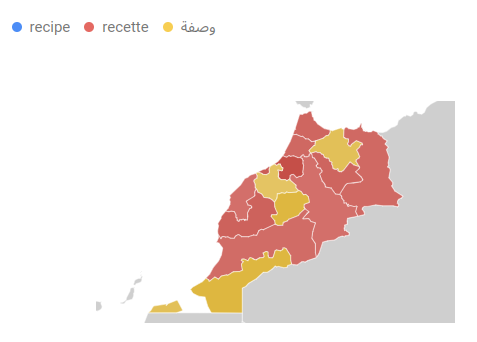

Map and Trends for Algeria
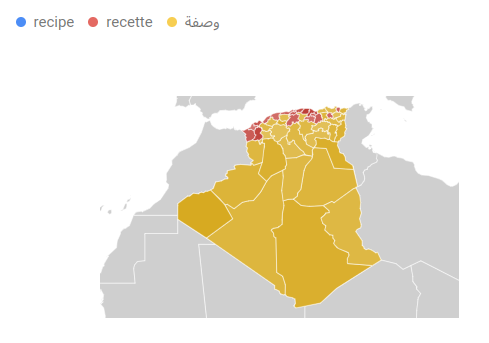

Map and Trends for Tunisia
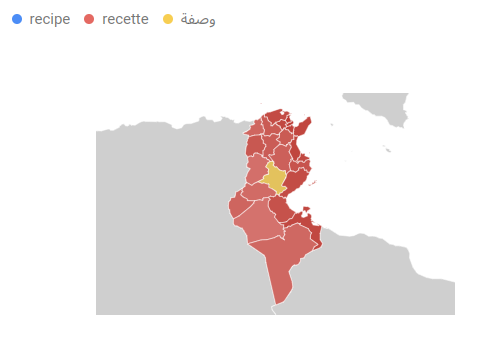

Cluster 2: Egypt and Jordan
Next, we move to Egypt and Jordan, where the linguistic tug-of-war plays out between English and Arabic. In Egypt, the capital Cairo and resort city Sharm el-Sheikh show a strong preference for English, while the rest of the country leans Arabic. Over the past five years, English has inched ahead, a minor American cultural hegemony one Google search at a time. There is a faint whisper of French usage, but it’s not enough to compete.
Jordan, too, finds itself in a linguistic deadlock, with English and Arabic vying for attention. A reflection, perhaps, of the country’s ambivalence.
Map of Egypt
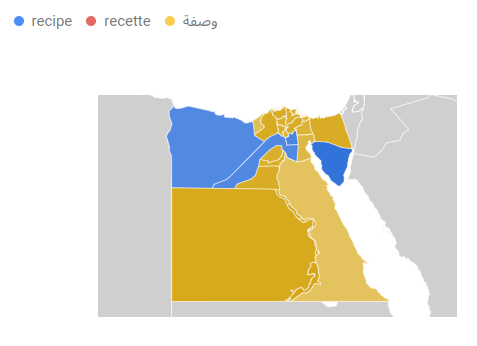
Google Trends in Egypt

Map of Jordan
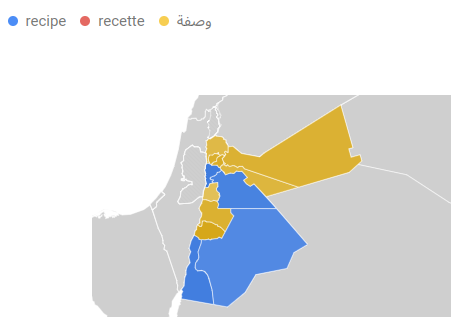
Google Trends in Jordan

Cluster 3: Libya, Sudan, Syria, Yemen
Now we enter a world where Arabic reigns supreme. In Libya, Sudan, Syria, and Yemen, English or French barely make a dent. It’s Arabic all the way. The one interesting anomaly? These nations, save for Sudan, have historically aligned with the USSR and now lean towards the Russia-Iran axis. Coincidence? Perhaps, but worth pondering.
Map and Trends for Libya
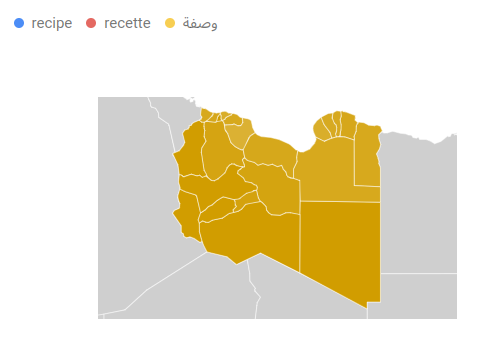

Map and Trends for Sudan
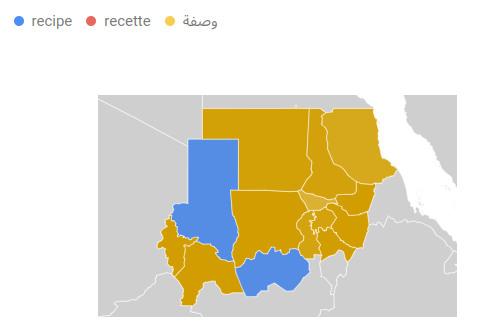

Map and Trends for Syria
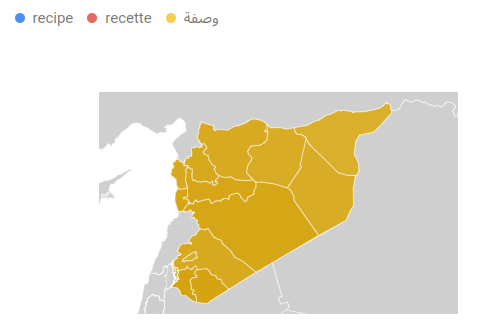

Map and Trends for Yemen
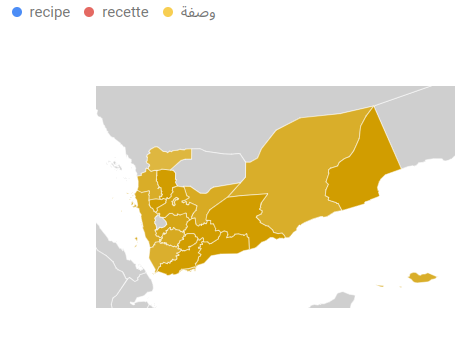

Cluster 4: Gulf Countries (UAE, Bahrain, Kuwait, Oman, Qatar)
Ah, the Khaleej. The birthplace of the Arabic language, where, paradoxically, English dominates. In Saudi Arabia, English search terms outstrip Arabic by a wide margin. In the UAE, Arabic is practically an endangered species, drowned out by the linguistic tide of expatriates. One wonders if there’s even a way to separate native usage from that of the massive migrant workforce.
Map and Trends for UAE
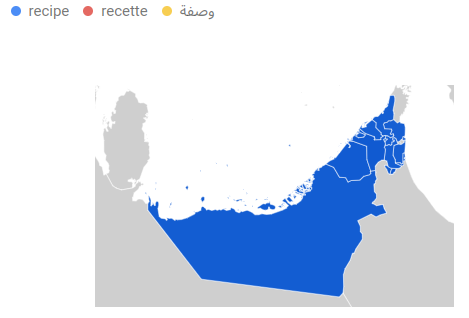

Map and Trends for Bahrain
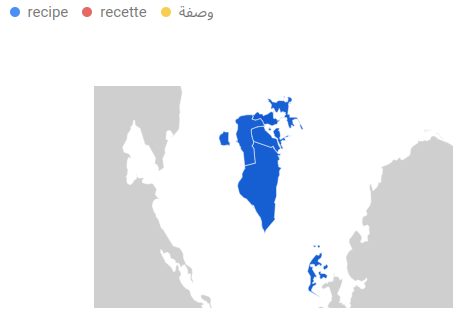

Map and Trends for Kuwait
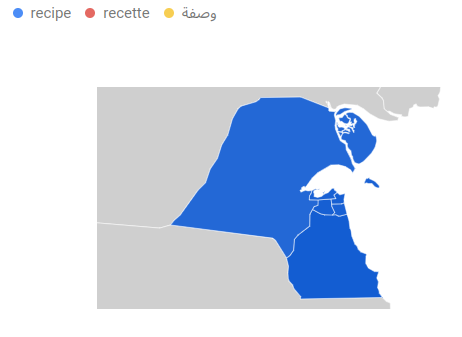

Map and Trends for Oman
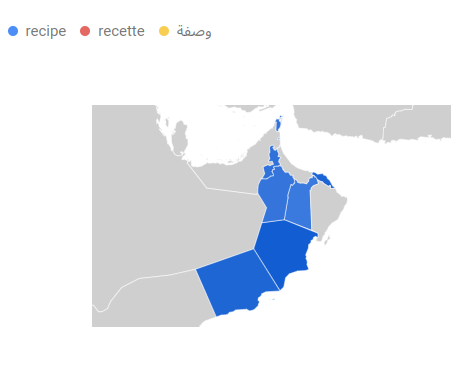

Map and Trends for Qatar
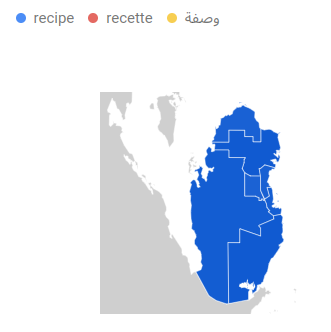

Map and Trends for Saudi Arabia
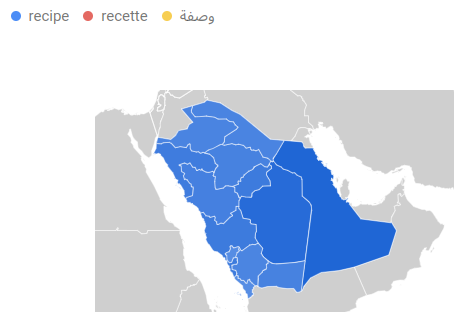

Cluster 3: Lebanon
Lebanon is a linguistic kaleidoscope. Before 2011, French and English were neck and neck. Then English surged ahead, and now it overshadows French in searches. Yet Arabic and French remain close in usage, a testament to Lebanon’s colonial past and the enduring influence of French culture. But don’t underestimate America’s cultural juggernaut, as Lebanon increasingly uses English.
Map and Trends for Lebanon
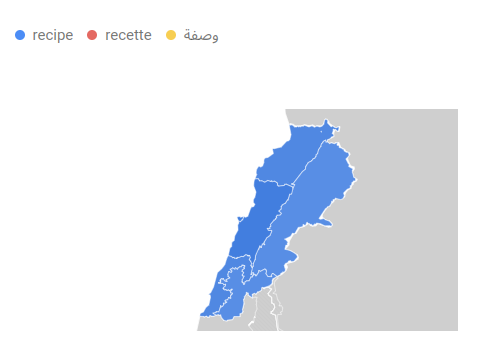

Cluster 5: Iraq
In Iraq, the situation is no less fascinating. Arabic once dominated searches, but since 2018, English has taken the lead. In the Kurdish north, English is more prevalent than Arabic. Alas, my Kurdish is insufficient to be sure of the word for “recipe” in Sorani Kurdish, but I can assure you it would make for an interesting footnote.
Map and Trends for Iraq
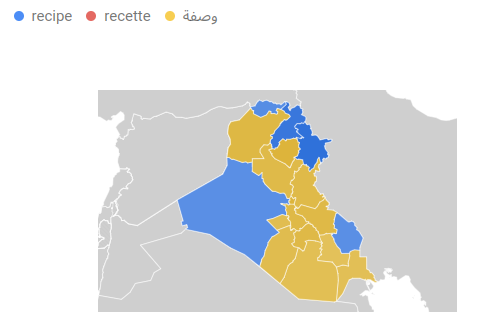

Conclusion
So, how do Arabic speakers search for recipes? It depends. North Africa’s French-speaking legacy endures. The Gulf, paradoxically, prefers English. If you live in a country once aligned with the USSR, Arabic is your go-to. And then there are the wild cards, like Egypt and Jordan, where English and Arabic are in a perpetual wrestling match.
And so, whether you’re googling in French, English, or Arabic—or calling your parents for that perfect recipe—the past is never as far away as it seems. It’s there, lingering in language, in culture, and in every search query you type.